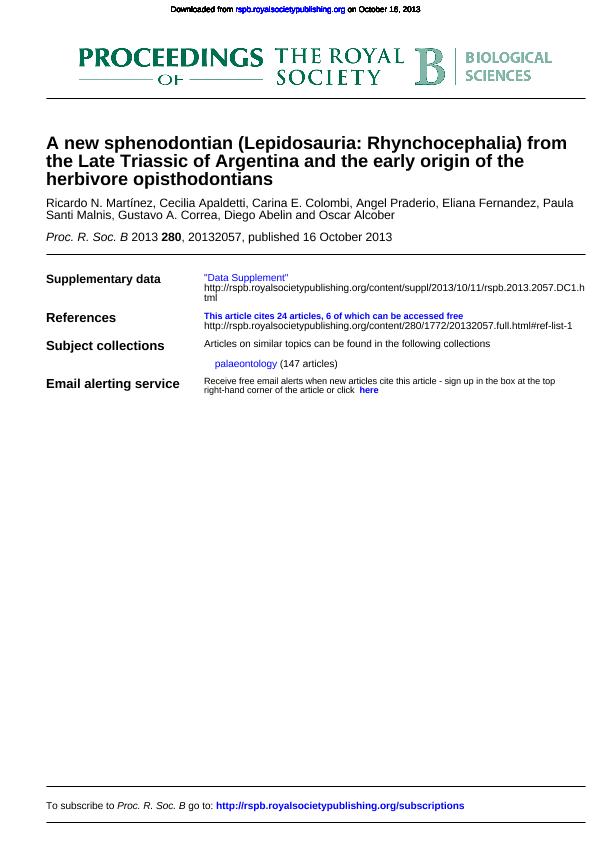Artículo
A new sphenodontian (Lepidosauria: Rhynchocephalia) from the Late Triassic of Argentina and the early origin of the herbivore opisthodontians
Martínez, Ricardo; Apaldetti, Graciela Cecilia ; Colombi, Carina Ester
; Colombi, Carina Ester ; Praderio, Angel; Fernández, Eliana; Santi Malnis, Paula
; Praderio, Angel; Fernández, Eliana; Santi Malnis, Paula ; Correa, Gustavo Alejandro
; Correa, Gustavo Alejandro ; Abelin, Diego; Alcober, Oscar
; Abelin, Diego; Alcober, Oscar
 ; Colombi, Carina Ester
; Colombi, Carina Ester ; Praderio, Angel; Fernández, Eliana; Santi Malnis, Paula
; Praderio, Angel; Fernández, Eliana; Santi Malnis, Paula ; Correa, Gustavo Alejandro
; Correa, Gustavo Alejandro ; Abelin, Diego; Alcober, Oscar
; Abelin, Diego; Alcober, Oscar
Fecha de publicación:
10/2013
Editorial:
The Royal Society
Revista:
Proceedings of the Royal Society of London. Series B: Biological Sciences
ISSN:
0962-8452
Idioma:
Inglés
Tipo de recurso:
Artículo publicado
Clasificación temática:
Resumen
Sphenodontians were a successful group of rhynchocephalian reptiles that dominated the fossil record of Lepidosauria during the Triassic and Jurassic. Although evidence of extinction is seen at the end of the Laurasian Early Cretaceous, they appeared to remain numerically abundant in South America until the end of the period. Most of the known Late Cretaceous record in South America is composed of opisthodontians, the herbivorous branch of Sphenodontia, whose oldest members were until recently reported to be from the Kimmeridgian?Tithonian (Late Jurassic). Here, we report a new sphenodontian, Sphenotitan leyesi gen. et sp. nov., collected from the Upper Triassic Quebrada del Barro Formation of northwestern Argentina. Phylogenetic analysis identifies Sphenotitan as a basal member of Opisthodontia, extending the known record of opisthodontians and the origin of herbivory in this group by 50 Myr.
Palabras clave:
Lepidosauria
,
Sphenodontia
,
Opisthodontia
,
Upper Triassic
Archivos asociados
Licencia
Identificadores
Colecciones
Articulos(CCT-CENPAT)
Articulos de CTRO.CIENTIFICO TECNOL.CONICET - CENPAT
Articulos de CTRO.CIENTIFICO TECNOL.CONICET - CENPAT
Articulos(SEDE CENTRAL)
Articulos de SEDE CENTRAL
Articulos de SEDE CENTRAL
Citación
Martínez, Ricardo; Apaldetti, Graciela Cecilia; Colombi, Carina Ester; Praderio, Angel; Fernández, Eliana; et al.; A new sphenodontian (Lepidosauria: Rhynchocephalia) from the Late Triassic of Argentina and the early origin of the herbivore opisthodontians; The Royal Society; Proceedings of the Royal Society of London. Series B: Biological Sciences; 280; 1772; 10-2013; 1-7
Compartir



